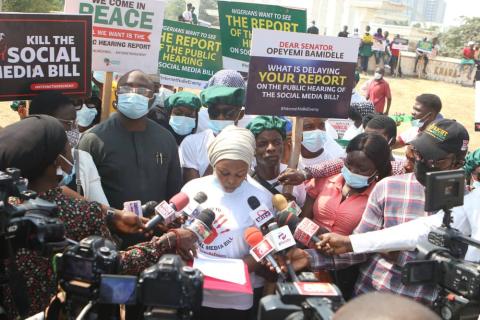
Even though the proposed social media bill has yet to be passed into law, the Nigerian government is already involved in internet censorship coupled with the occasional attacks on freedom of expression.
The coalition of civil society groups in Nigeria, on Tuesday, took to the streets of the Federal Capital Territory to protest the delay by the National Assembly to publish its report on the proposed social media bill.
The protesters, who displayed placards with various inscriptions, defied the heavy presence of security operatives at the unity fountain and called on the Nigerian Senate to publish the report of the public hearing conducted on the bill.

Addressing journalists on behalf of the Coalition, one of the protesters, Maryam Ahmed, described the bill as a threat to freedom of speech and digital freedom in Nigeria.
According to her, the bill sponsored by Senator Muhammed Sani Musa in November 2019, has remained a lingering threat to freedom of speech and digital freedom in Nigeria.
She said: “Today, one year after, the future of free speech and democracy in Nigeria is still at the mercy of a Senate that appears to be uninterested in publishing the report of the public hearing, wherein the bill was overwhelmingly rejected, nor willing to conduct a third reading on the bill where it is expected to be killed and buried eternally.
“The apparent lack of interest from the Senate in killing the social media bill suggests a sinister intent to pass the dangerous bill, which criminalises freedom of expression when Nigerians are least vigilant.

“Despite several international instruments that Nigeria is a signatory to and developments within the last one year that ought to serve as enough reasons to kill the social media bill, the red chamber remains unwilling to do so.”
She added that even though the proposed social media bill has yet to be passed into law, the Nigerian government is already involved in internet censorship coupled with the occasional attacks on freedom of expression.
She cited the recent restriction of access to the People’s Gazette website, an online news medium, by some telecommunication providers in Nigeria.
Ahmed said democracy can only be strong in Nigeria through the promotion of citizens’ rights, especially constitutionally guaranteed ones like the right to freedom of expression.

She said, “The social media has proven over and over to be a platform of equitable expression for Nigerians. To pass a bill like the social media bill will not only be a direct attack on equity and free speech, but it will fundamentally alter Nigeria’s democracy in ways that may lead to unforeseen troubles for the country.
“We are, therefore, propelled to demand again that the Senate must not delay any further to kill and bury the social media bill permanently.
"This follows a suspected intentional truncation of internet services in some parts of the country on October 20, 2020, during the #EndSARS protest, and particularly after the deadly attack on peaceful protesters at the Lekki Toll Gate, Lagos.”